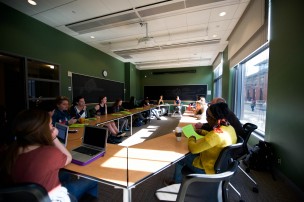Wesleyan’s chapter of Shining Hope for Communities (SHOFCO) hosted a panel on April 16 titled “Volunteering Abroad: A Discussion on the Roles of Development.” Faculty members shared their experiences with international service work, discussing both its benefits and the controversies surrounding the practice. The speakers were Assistant Professor of Sociology Robyn Autry; Assistant Professor of History and Peace Corps alumna Laura Ann Twagira; Assistant Professor of Government and Peace Corps alumnus Michael Nelson; and John E. Andrus Professor of Sociology, Director of the Allbritton Center for the Study of Public Life, and former SHOFCO board member Rob Rosenthal.
The speakers dissected the concept of voluntourism—paying to go abroad to volunteer with a nonprofit organization—from sociological, governmental, historical, and personal perspectives. It centered on the question of whether or not certain forms of assistance and volunteer work are actually as beneficial as they are thought to be.
Lex Spirtes ’17 offered one answer to this question by bringing up the way some programs may try to change the way people are living just because it is different from what the porgram’s participants are used to.
“I think an issue is this idea of helping as mimicking our society somewhere else,” Spirtes said. “[There are people] saying that what we’re doing is right and the way that you’re living is less just because it’s different. There obviously are issues, especially with poverty and violence, but I feel like we’re also trying to fix things that aren’t necessarily broken, but are just different.”
Former fellow of the SHOFCO Summer Institute Alix Haber ’11 also commented on how the SHOFCO Summer Institute is an exception to the way voluntourism usually goes.
“The SHOFCO Summer Institute actually does it really well,” Haber said. “I mean, I ran it for two years, so I’m pretty biased as it goes. But the question is, what is your skill, what are you providing to the community that could not be found more easily and far more cheaply there? And the kind of summer camp that the Summer Institute offers with such a high level of engagement isn’t something that really exists in Kenya otherwise.”
When the discussion shifted toward personal involvement with voluntourism, Nelson shared his experience as a member of the Peace Corps.
“I got good advice going in, which was that you should listen to people, and that most of what you’re going to be doing is cultural exchange,” Nelson said. “If you go in thinking that you’re going to save the world, you’re going to be disappointed and also probably make mistakes.”
Twagira, who also served in the Peace Corps, said that expecting cultural exchange, rather than simply acting as a Westerner trying to help, is a better and more realistic attitude to have about what programs like the Peace Corps do.
“One of the reasons I decided to apply for the Peace Corps was the same good intention of wanting to learn more about the world, about my place in it, about having a more meaningful aspect to what I’m doing with my life,” Twagira said. “But I think one of the things that I took away from that is how much I learned from other people in the camp I was in in Mali. I was struck by how much Americans can learn from other cultures. For example, the way that babies are potty trained in Mali is amazing! They’re potty trained at such a young age. That’s just one example, but there are a lot of ways in which I sort of realized that this was a really rich place with lots of things to teach.”
Toward the end of the panel, Jillian Roberts ’15, a member of SHOFCO-Wesleyan’s executive board, said that using volunteer opportunities to step away from a privileged life should not always be seen as negative.
“I think there’s not necessarily a negative value to wanting to leave luxury for a moment, to push away from the privilege you have and be able to experience some manual labor and getting that hard work feeling,” Roberts said. “I think if that’s a momentary thing you want to experiment with, that’s something you might want to think twice about. But…if you want to use that as motivation to live the rest of your life in that way, using your privilege to do good things, then that’s good. But there’s a distinction between momentarily stepping out of your privilege and luxury and then coming back to it, and living by that guideline.”
